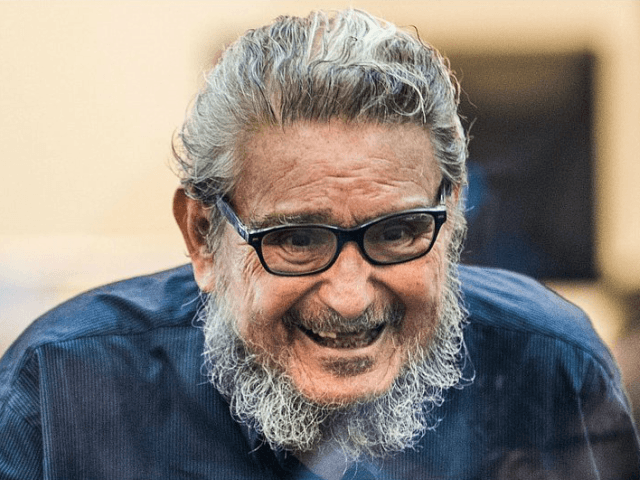An attorney for Abimael Guzmán, the head of a Peruvian Marxist terrorist group responsible for over 35,000 deaths, demanded his client’s freedom on Wednesday, citing a medical pardon for the president in charge during his capture, Alberto Fujimori.
Sendero Luminoso, or the Shining Path movement, was a communist guerrilla terror outlet that largely targeted the nation’s countryside in acts of killing, kidnapping, and drug trafficking. It also engaged in acts of mass murder, including the 1992 Tarata bombing, which left 25 dead and 155 injured in the heart of the city of Miraflores.
Peruvian officials have found evidence of Shining Path members engaging in drug trafficking as recently as 2015, though their leader, Guzmán, has been serving a life sentence in prison since 1992.
President Pedro Pablo Kuczynski announced on Christmas Day that he would issue a pardon to Fujimori, 79, for medical reasons, triggering protests from leftists across the country.
Later in the week, Alfredo Crespo, Guzmán’s attorney, posted a plea for his client’s release on Facebook.
“They gave Mr. Fujimori, who was sentenced due to acts related to the internal war Peru lived, and my client, who was also sentenced for matters relating to the internal war, and is sick, cannot be freed,” he protested. “I request both as an attorney and private citizen the freedom of my client, Dr. Abimael Guzmán, in prison for 25 years.”
The president has not responded officially to the request, and there is little indication that the Peruvian government is interested in liberating Guzmán. Crespo did not specify what medical ailments Guzmán allegedly suffers from.
Guzmán was sentenced to life in prison for terrorism and crimes against humanity in 1992. In contrast, Fujimori, after having imprisoned Guzmán and paraded him in a cage to the Peruvian public, was arrested in 2005 after having fled Peru for his parents’ native country, Japan, before arriving back in Chile. Fujimori was serving a 25-year prison sentence for alleged extrajudicial killings and illicit conduct against political enemies when Kuczynski announced his sentence commutation.
A presidential statement on the matter explained that Fujimori is suffering from “a progressive, degenerative and incurable disease.” Fujimori was serving his time in a prison alongside Kuczynski’s predecessor, leftist former president Ollanta Humala. Fujimori reportedly sent Humala welcome sandwiches through his son, Congressman Kenji Fujimori.
While reports circulated that the elder Fujimori was planning another presidential run before his arrest, after having served as head of government between 1990 and 2000, it is unlikely that the elderly politician would reenter politics now, particularly after his daughter Keiko’s two failed presidential bids (Kuczynski, a center-right candidate, beat the hard-right Fujimori in the 2016 presidential election). In contrast, there is evidence that Shining Path has attempted to regroup in recent years, and Guzmán engaged in threatening behavior in a courtroom as recently as this month.
In a hearing this December, Guzmán, who remains on trial for the Tarata bombing and drug trafficking, interrupted a prosecutor detailing evidence against him for drug trafficking, standing up and bellowing, “you don’t know who you’re dealing with!” The prosecutor had requested the court allow her to question the former head of the police intelligence group that cracked down on Shining Path in the 1990s. Guzmán reportedly also mimicked shooting the prosecutor with a gun while in court.
Despite being largely eradicated from Peru by the middle of Fujimori’s tenure, then-Peruvian Minister of Defense Jakke Valakivi said in 2015 that police had found evidence of Shining Path members kidnapping and enslaving people in the countryside and forcing them to participate in drug cultivation. “This terrorist group has not been exterminated. They operate, but with reduced capacity, obviously,” Valakivi said at the time, noting that the region affected was “abandoned zone to the back of the Andes mountains where no one wants to look.”
A year earlier, then-U.S. Attorney Preet Bharara charged three members of Shining Path with running a drug trafficking ring in New York.
Many Peruvians attribute the significant reduction in communist terrorist activity in the 1990s and the capture of Guzmán to Fujimori, who acknowledged that he also has many critics following his release this week.
“I am aware that the results of my government[‘s work] were well received in part, but I also recognize that I have defrauded other compatriots,” he said in a video posted to Facebook. “To them, I ask for forgiveness with all my heart.”

COMMENTS
Please let us know if you're having issues with commenting.